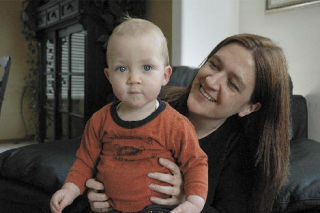MARYSVILLE — On this day, which just happens to be a few days shy of his first birthday, Dax Gilbertson toddles across the carpeted floor of his family’s living room and, as infants sometimes do, abruptly falls down.
And giggles.
Further, on this occasion, after Dax tumbles, mom Melissa Gilbertson just smiles. Dax is not having one of the up to 20 seizures he is subject to having each and every day. He has had three already on this particular day.
“He knows when he’s going to have one and sometimes he just sits down,” Melissa said.
As Dax celebrated birthday number one on May 1, the tuberous sclerosis plaguing him is so little known Melissa said doctors didn’t know what to make of his problems at first. After an ultrasound taken before he was born, doctors told Melissa her son suffered from Elephant Man syndrome. A blood test taken later revealed the real problem.
Caused by a chromosomal defect, tuberous sclerosis is characterized by, most seriously, the growth of tumors on vital organs. Doctors found the tumors on Dax’s heart via that prenatal ultrasound. The seizures started two months ago and doctors this time found growths on Dax’s brain. Melissa said Dax will need to be checked regularly for tumors on his kidneys and eyes.
Tumors developed as a result of tuberous sclerosis aren’t cancerous, but can still cause serious damage. For now, Dax’s brain tumors are causing seizures; tomorrow, they could cause mental retardation. For now anyway, they are too small to be removed surgically.
“That’s the horrific thing about this disease is, you have to wait and see,” Melissa said.
A biology teacher at Marysville-Pilchuck High School, husband Ryan agrees.
“That is the hardest part, the unknown,” he said.
“One day he knows how to walk, the next day he doesn’t,” Melissa added.
While admittedly fighting a somewhat losing battle not to let Dax’s illness take over her life, Melissa also seems to be on at least a bit of a mission to gain some attention for her son’s condition.
Consisting of the Gilbertson’s extended family, Team Dax will be among those taking part in a fund-raising walk for the Tuberous Sclerosis Alliance, May 17, in Seattle’s Magnuson Park. Melissa said the support groups and on-line chat rooms offered by the alliance have been a life line for her.
Last week, she tried to return the favor, serving as a volunteer for a tuberous sclerosis medical conference held prior to the walk, a conference which brought together doctors and experts from across the country.
According to Melissa and information provided by the alliance, tuberous sclerosis can be passed on from parents or result from a spontaneous genetic mutation. In Dax’s case, parental blood tests showed it was the latter. Dax has an older brother and sister who show no signs of the disease.
On average, according to the sclerosis alliance, the disease will strike about two children born each day in the U.S. World wide, about 1 million have the genetic disorder.
As she talks about her son, Melissa is, a couple of times, unable to stop from crying. She described herself as a “basket case” following the discovery of the tumors on Dax’s heart.
“It just came out of the blue,” Ryan said. “It’s kind of like getting hit in the chest. Of course, you want every one of your kids to be healthy and happy.”
“You always hear about things like this in other families, but you really can’t realize how hard it is to deal with something like this,” Melissa added.
Melissa now spends a lot of time visiting both Swedish Medical Center and specialists at the University of Washington. She has cut back to working part-time, as Dax needs full time attention. There seems to be some disagreement between the parents over whether, at least in one aspect, all those doctors are doing Dax any good.
“We’re on the third seizure medication and it’s not working,” Melissa said.
In a separate interview, Ryan said prescription number three is helping and expressed hope the seizures are becoming things of the past. But working or not, Melissa isn’t happy with the treatment, no matter how necessary.
“The medication makes him seem like he’s a little drunk,” she said. “You cry because it’s your baby and he’s not even one year old and he’s wasted.”
Besides teaching biology, Ryan also is a baseball and football coach for Marysville-Pilchuck. Both he and Melissa are members of
M-P’s Class of 1993. Ryan said they weren’t high school sweethearts, though, but got together a few years after graduation.
Both Ryan and Melissa talked about doing a lot of Internet research following that fateful ultrasound. But Ryan said he has one piece of advice for anyone dealing with a seriously ill family member and that is to stay far away from the Web.
“There’s a negative bias, that’s what makes news,” Ryan said. “It’s not fair to yourself to put yourself through that negativity constantly.”
“You have so much hope,” Melissa said. “You have to have hope.”



